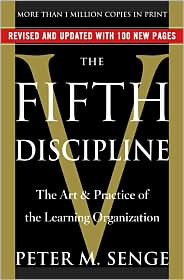 Este libro de Peter Senge no es de la temática de la Ingeniería de Software sino es mas del área de organización empresarial. Las ideas que propone son muy interesantes.
Este libro de Peter Senge no es de la temática de la Ingeniería de Software sino es mas del área de organización empresarial. Las ideas que propone son muy interesantes.Una organización inteligente cuenta con las siguientes disciplinas:
- Dominio personal
- Modelos mentales
- Construcción de una visión compartida
- Aprendizaje en equipo
- Pensamiento sistémico (la quinta disciplina)
El comenta todos los puntos anteriores, contando experiencias o historias de problemas que tuvieron distintas empresas y cuales fueron las causas. Todos los problemas los describe mediante diagramas indicando la situación, que alimenta a cada consecuencia y como aplicar una 'palanca' para resolver estos problemas.- Modelos mentales
- Construcción de una visión compartida
- Aprendizaje en equipo
- Pensamiento sistémico (la quinta disciplina)
Senge propone al pensamiento sistémico como la quinta disciplina, el arte de ver el árbol y el bosque, no abstraerse siempre perdiendo de vista la complejidad total de un sistema.
A continuación transcribo una parte del libro, donde comenta la importancia de que una organización tenga una visión compartida:
As a part of building shared vision, the process of committing to live by certain basic values also undermines internal politics. Once, as part of a three-day visioning session for the management team of a Boston area technology firm, the question of honesty came up. The group had casually identified "honesty and forthrightness in all communications" as one of their operating ground rules. The management team had developed a vision they were beginning to get really excited about, when one of the senior salespeople commented off handedly, "Of course, we don't mean that we will be honest to our customers."
The entire process ground to a halt. The group reconsidered what they meant by "commitment to honesty and forthrightness in all communications." The president broke the silence by stating, "Yes. For me, this means being completely honest with our customers."
The salesman responded, "If we do we'll lose 30 percent of our booking next month. In this business none of our competitors are honest when they tell a customer when a new computer system will arrive. If we tell the truth, our delivery times will be 50 percent longer than what customers believe they will get from competitors."
"I don't care," was the president's response. "I simply don't want to be part of an organization that sanctions lying, to our customers, our vendors, or anyone else. Moreover, I believe that, over time, we'll establish a reputation for reliability with our customers that will win us more customers than we'll lose."
The exchange continued for more than an hour. At the end, the group was together in support of telling the truth. The salesperson knew that if bookings dropped off in the next month or two, the other members of the team would not come screaming for his head. And he and the rest had begun to develop a vision of building a new reputation for honesty and reliability among their customers. This session took place six years ago. In the intervening period, the firm has prospered and established a preeminent position in its niche market.
No hay comentarios.:
Publicar un comentario